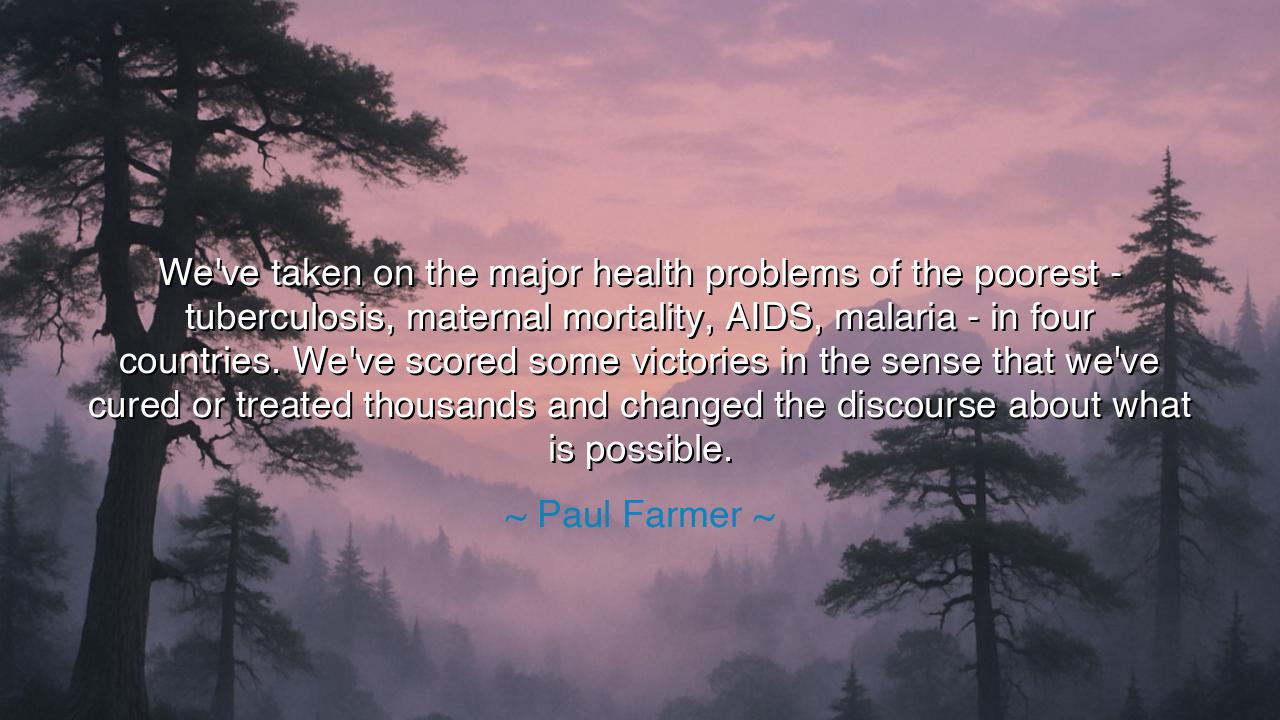
We've taken on the major health problems of the poorest -
We've taken on the major health problems of the poorest - tuberculosis, maternal mortality, AIDS, malaria - in four countries. We've scored some victories in the sense that we've cured or treated thousands and changed the discourse about what is possible.






In the annals of human compassion, few voices resound with such quiet power as that of Paul Farmer, healer of the poor and defender of dignity. When he declared, “We’ve taken on the major health problems of the poorest — tuberculosis, maternal mortality, AIDS, malaria — in four countries. We’ve scored some victories in the sense that we’ve cured or treated thousands and changed the discourse about what is possible,” he did not boast as kings boast of conquest. Rather, he spoke as one who had journeyed into the heart of suffering and emerged with a new gospel: that justice in health is not a dream, but a duty. His words are both a record and a revelation — the record of what has been achieved, and the revelation of what yet can be done when compassion is given hands and purpose.
To understand these words, one must see the world as Paul Farmer saw it — a world divided not by the will of the Creator, but by the cruelty of circumstance. In the high mountains of Haiti, in the humid villages of Rwanda, in the silent wards of Peru and the broken streets of Russia, he saw the same pattern: diseases that had long been banished from rich nations still ravaged the poor. Tuberculosis, AIDS, malaria, and maternal death were not punishments of nature, but consequences of neglect. The wealthy declared such suffering inevitable, but Farmer refused that lie. He believed that medicine, when bound to mercy, could reshape the possible. And so he began — not with vast armies or golden treasuries, but with faith in the infinite worth of each life.
Once, in the village of Cange in Haiti, there stood a church whose walls were made of mud and hope. There, Farmer and his companions built not only a hospital, but a vision — a place where those who had been forgotten by the world could be treated as though they were kings and queens of creation. The sick arrived on foot, from mountains and valleys, and were greeted not with pity, but with reverence. Antibiotics were given to those dying of tuberculosis, women were guided safely through childbirth, and those marked by AIDS were embraced with love, not fear. These were not small gestures; they were acts of defiance against despair itself. Each healed person became a living argument against the tyranny of inequality.
And as word spread of their work, something greater than medicine was achieved — the discourse changed. Where once the scholars and policymakers had said, “It cannot be done,” now they said, “It must be done.” Farmer’s triumph, then, was not only in the bodies he healed, but in the imaginations he liberated. For the gravest illness in the human spirit is not disease, but resignation — the quiet surrender that says some lives are simply less valuable than others. He showed the world that when the boundaries of care expand, the boundaries of possibility expand also.
The ancients would have called such a man a physician-saint, one who tends both the flesh and the soul of humanity. Yet even Farmer, in his humility, knew that victory was not complete. To cure thousands was a miracle; but to change the system that condemns millions to needless death — that is a battle for generations. And so his words remind us that each act of healing, however small, is a seed of revolution. The plow of compassion must turn the soil of indifference until justice grows there.
Learn, then, O listener, from his example: Do not accept the limits others place upon mercy. When you see suffering, do not ask whether it is profitable to intervene — ask whether it is righteous. For every human being is a scripture of sacred worth, and to heal one life is to defend all life. Even if you are not a doctor, your compassion is a medicine the world cannot live without. Bring it to your family, your community, your work — and there, perform your own quiet miracles.
For the world is still divided between those who believe in scarcity and those who believe in abundance of spirit. Paul Farmer stood among the latter, teaching that when we serve the poor, we do not descend — we ascend. His victories were not measured in numbers but in hope restored. And the lesson he leaves us is eternal: that the limits of the possible are not set by nature, but by the courage of our hearts. Let each of us, in our own way, take up that same sacred task — to heal what is broken, to defy what is “impossible,” and to make the world, one act at a time, more merciful than we found it.






AAdministratorAdministrator
Welcome, honored guests. Please leave a comment, we will respond soon